The Worst and Best of Times in Québec
By Maurie Alioff
(January 4, 2024 – Montréal, QC) As 2023 fades out, the year’s biggest story shocked the film and media industries – and everyone else – in 2023’s final month. At the beginning of December word came that Daniel Langlois, best known as the founder of the 3-D animation effects company, Softimage had been murdered on the Caribbean island of Dominica. Langlois’s charred body, and the corpse of his long-time partner Dominique Marchand, were found in their burnt out SUV.
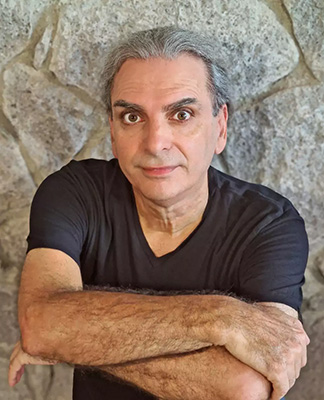 “It is all ironic and grotesque,” a person who knew Langlois well over the years told me during an interview. “He was a visionary of some kind, and his final project, a lavish Dominican eco-resort hotel which was typically ahead of its time, was part of the incredible vision that he had.” The murder was “gruesome and stupid and really fucked up. The incredible clumsiness included a hired killer who went to the hospital to get his hands checked after setting fire to the car.”
“It is all ironic and grotesque,” a person who knew Langlois well over the years told me during an interview. “He was a visionary of some kind, and his final project, a lavish Dominican eco-resort hotel which was typically ahead of its time, was part of the incredible vision that he had.” The murder was “gruesome and stupid and really fucked up. The incredible clumsiness included a hired killer who went to the hospital to get his hands checked after setting fire to the car.”
The hospital visit led to the arrest of Jonathan Lehrer and Robert Thomas Snider. Lehrer is an American chocolatier who lost crazed legal battles over a road that cut through his property to reach Langlois’s entirely offline Coulibri Ridge Hotel. The resort is on a vast, elevated property with sweeping views of the sea and Martinique in the distance. Like many of Langlois’s projects, Coulibri was both entrepreneurial and idealistic. A philanthropist who benefitted creative artists with an interest in technology, as well as Dominican people endangered by natural disasters, it looks like the 66-year-old’s life was snuffed out by a lunatic, murderous, chocolate making Willy Wonka. As a young man, Langlois was blessed with talent and phenomenal success (he sold Softimage to Microsoft for a fortune that enriched him for life), and ended cursed by a horrifically violent, absurd death.

Langlois’s long and winding road, which obviously could be a movie, began as an animation filmmaker involved with the National Film Board of Canada. Langlois was one of the creators of Tony de Peltrie (1985, pictured above), an early CGI animation short. The film depicts the reveries and hallucinations of an aging lounge pianist recalling his glory days. Throughout the film, a broadly cartooned De Peltrie never leaves his piano, playing and singing until he literally fades away. Did the experiment in computer animation foreshadow Langlois’s fate?
According to my knowledgeable source, who prefers to remain anonymous, Langlois picked up inklings of his 3-D software at the NFB. A “vague prototype of what would become Softimage” led to an early proposal, which was rejected by a funding group because the “incredible proposal” was probably “already being done by the Americans, a shall-we-say once typical Canadian attitude. At this point Langlois turned to Char Davies, a girlfriend from a wealthy family that filled in on the financing to launch his project.”
Langlois pitched to early funders who eventually made a fortune on their investment. Devies joined the burgeoning Softimage and became a VR artist exploring the underwater world. ”Langlois insisted that Softimage be downtown,” says my interviewee, “part of the urban landscape. He felt that would attract the right people. He also didn’t want any signs on the office or the building on Milton street.”
One key to Softimage’s huge success (its software key to movies like The Matrix and Jurassic Park) was Langlois’s recruitment of top programmers from a variety of sources and countries, including skilled techies who had experimented at Banff. “Head-hunters were looking for smart people who might work for Softimage,” says my source. “The thing really took off at that point, and Langlois was shipping more and more product. He contacted people at various Canadian embassies around the world, and asked them to find the smartest programmers in countries like Italy, Japan, and Germany.” Meetings led to the creation of subsidiaries agreeing to 51 – 49% splits, controlling interest going to Langlois.
Of course, conflicts and battles arose. A Softimage executive built a rival company called Discreet Logic. Meanwhile, some of Langlois’s ideas flew and others didn’t. “He was of the moment,” says the man who was on the scene. “Young guys who realized there was something to be done.” Other companies focused on software for TV graphics. For Langlois, “This was going to be about film, ambitions for film.”
Langlois started investing in movies and had a plan, says my source, to “develop an instantaneous distribution system via satellite. In fact, he bought two satellites. But distribution at that time was basically a Hollywood cartel, and the Internet was developing very fast. Langlois set up a proof of concept at TIFF, but it didn’t look like the idea was going to fly.”
Ever ambitious and inventive, Langlois also “wanted to develop a single platform where you can do all the postproduction, even down as far as final cut.” The platform would facilitate editing, special effects, everything on one machine. Simultaneously, Langlois opened Excentris, a sprawling cultural centre with facilities for experimentation and three cinemas, as well as an ingeniously designed café he helped to create.
According to widespread rumour, Excentris was flanked by restaurants with owners Montreal was suspicious of. “The city,” said my source, “decided to push the taxes on that block through the roof. Langlois feared his complex and restaurant losing money because of the taxes, and at that point he began to shift his focus to thinking about the Eco resort thing.”
Langlois dropped his involvement with Montreal’s Festival du nouveau cinema and the Cinéma du parc and shifted direction. A boutique hotel in Montreal flubbed because for some reason the city wouldn’t grant a liquor license. Then Langlois “started going around the world and looking at different places to activate his concept of the eco-resort, and decided that the place to do it was Dominica.”
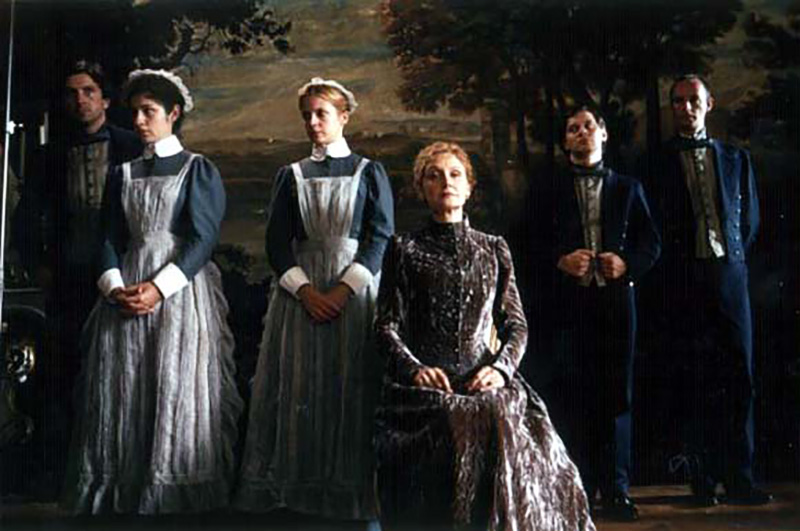
As a film producer, Langlois released only two pictures: one by Robert Lepage and Michael Mackenzie’s The Baroness and the Pig (pictured above). Based on his own play, Mackenzie says Baroness “was one of the first movies made with digital cinematography ,” and in fact it was the picture Langlois had delivered to TIFF in a satellite feed.
“Daniel Langlois made a wonderful decision to finance a first time filmmaker’s feature,” says Mackenzie. “He was very happy because it fit in his whole satellite transmission model. Daniel was a very generous, helpful guy, who offered good feedback. I will always be very grateful to him for my first feature.”
Langlois’s ending saddens him deeply. “I knew both him and Dominique, and I found them really wonderful human beings. Daniel was a supportive guy with a lot of positive energy, and he was still a comparatively young man, so this is a horrible tragedy.”
There was also good news in 2023. An excellent crop of feature films were released following critical and audience successes at the Fantasia Film Festival, Hot Docs, The Toronto International Film Festival, the Festival du nouveau cinéma (FNC), and the Rencontres Internationales du Documentaire de Montréal (RIDM). The Quebec festivals not only survived COVID interruption, they drew wide audiences with a vast array of movies.
One sour note is that a major festival venue since it was the flagship of the Montreal’s now defunct World Film Festival is at risk. Because the Federal Government has withheld renovation money from the venerable classic Imperial Theatre, it could die at the end of January. Media giant Quebecor withdrew its lifeblood support presumably because of its own financial problems.
Says Benoit Clermont, who is on the Imperial Board, “We could count on the Quebec government, which has already committed to supporting the project to the tune of $5.6 million, as well as the involvement of the City of Montreal. Now, without a sufficient contribution from the Government of Canada, the feasibility of this project is seriously compromised, and the Imperial Cinema will have to cease operations.” The loss of the Imperial would be the equivalent of Toronto’s Elgin dying. It’s a landmark, and of the last of Montreal’s remaining theatres from the era of elegantly designed movie houses. Still operating minimally it’s across Bleury Street from the relatively new NFB building.
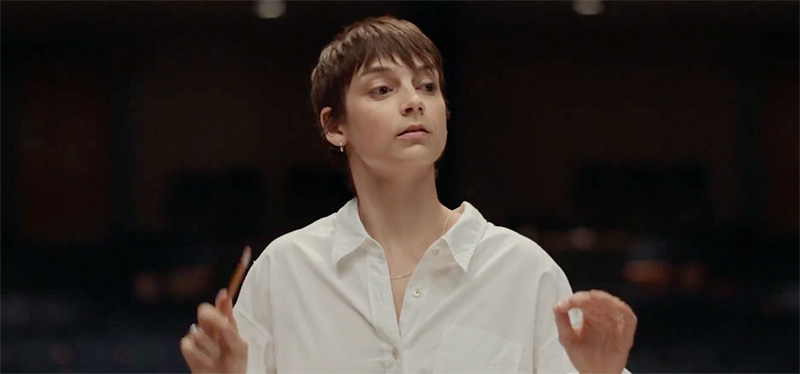
One of the movies that payed TIFF before the FNC, Chloé Robichaud’s Les Jouurs heureux (pictured above), is one of a trio of recent movies about orchestra conductors. Days of Happiness, however, has a focus very different from Tar’s and Maestro’s.
The youthful, even sometimes child-like Emma (Sophie Desmarais) handles her profession exceptionally well, conducting musicians with an attention to detail that can be overly meticulous and too demanding. But she gets undermined by jockeying for control with her dominating father, Patrick (Sylvain Marcel), who manages her career.
The crux of the film is Emma’s relationship with this domineering man, who has stifled her emotional range. Emma’s story arc is about getting herself out from under his thumb and liberating herself as a conductor.
During an FNC interview two weeks before the picture’s Quebec release, Robichaud told me that her story ends with Patrick saying, “I never laid a hand on you. But she answers that she was afraid her whole life. People think abusers if you don’t see any marks, is it really violent? Violence can take many forms. I think Patrick is very good at being violent in a more subtle way. And to keep her scared is also a form of control. She’s always on the edge. Am I going to do the wrong thing? He uses that fear. I think great manipulators are good at that.”
Shot mainly in intimate closeups, Robichaud’s film tracks Emma’s gradual opening up as a conductor (she’s been told she’s too technical) and a human being. As for the music, Robichaud spent years studying composers, particularly Mahler, (who is also at the emotional centre of Maestro), and conductors. She feels her film shares little with Tar. “We have something very different to offer. In Days of Happiness, music serves the character. In Tar, it’s not about that. It’s what’s happening behind the scenes, the power games, but it’s not about music.”
Chloé Robichaud, who enjoys changing direction in her movies, is now preparing to shoot an adaptation of Deux femmes en or, the late Claude Fournier’s 1970s hit, made during a run of more or less softcore sex pictures. “I think people forgot something very important about that film,” says Robichaud. “Everybody talked about the fact it was just women naked. However, in the 1970s, it’s about two women taking their sexuality on their own terms. That’s big. That’s feminist. The story is fun; it’s a comedy. I’m glad to be back to comedy. When I started in short films, that’s what I did.”
Robichaud saw and admired another of 2023’s top movies, Sophie Dupuis’s Solo, about a young drag queen star with a troubled relationship to his mother. Unlike Patrick in Days of Happiness, “she does it with a smile. I am here for you, but I am not.” Robichaud says of her character and Dupuis’s, “Some people are unable to love. I don’t know why. Too much blockage.”
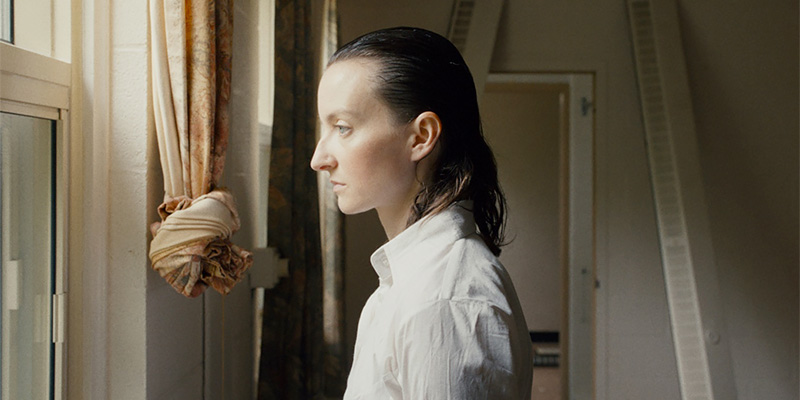
In Denis Côté’s Mademoiselle Kenopsia, the writer-director creates an eerie and hypnotic world where love and human relations barely exist. In fact, the protagonist, (Larissa Corriveau, pictured above), may be a ghost as she wanders around an abandoned hotel and makes enigmatic telephone calls. Côté, whose work has always been enigmatic, screened the movie at TIFF and also RIDM, a documentary festival. He offered a RIDM masterclass that zeroed in on crossing the line between fiction and documentary, which he does frequently. On the occasion of Côté’s, birthday, he was honoured by the Association des réalisateurs et réalisatrices du Québec (ARRQ), and was given a lifetime achievement award as part of RIDIM’s Prix RÉALS. Meanwhile, Denys Arcand, whose new film Testament got released in the fall was granted a Lifetime Achievement Award by the Director’s Guild of Canada. Denis Côté and Arcand embody the range of subject matter and style in Quebec cinema, and yet both are drawn to documentary.
 Other hot items in 2023 include Irena’s Vow, Louise Archambault’s compelling movie about a young Polish Jewish woman who infiltrated Nazis and Ariane Louis-Seize’s Vampire humaniste cherche suicidaire consentant aka Humanist Vampire Seeking Consenting Suicidal Person. Perfect in its execution, impeccably played, and loaded with ironic humour, the movie depicts a young woman, who really, really doesn’t want to be a vampire until she finds an unlikely resolution to her coming of age problem. Throughout the picture Louis-Seize and her co-writer Christine Doyon come up with swift and smoothly engineered plot twists. “The title is clever, but the film is so much more,” wrote Thom Ernst in his review for Northernstars.ca.
Other hot items in 2023 include Irena’s Vow, Louise Archambault’s compelling movie about a young Polish Jewish woman who infiltrated Nazis and Ariane Louis-Seize’s Vampire humaniste cherche suicidaire consentant aka Humanist Vampire Seeking Consenting Suicidal Person. Perfect in its execution, impeccably played, and loaded with ironic humour, the movie depicts a young woman, who really, really doesn’t want to be a vampire until she finds an unlikely resolution to her coming of age problem. Throughout the picture Louis-Seize and her co-writer Christine Doyon come up with swift and smoothly engineered plot twists. “The title is clever, but the film is so much more,” wrote Thom Ernst in his review for Northernstars.ca.
Clearly, French speaking producers and directors have had a good year, even when they shoot in English. The same is not true for English speaking moviemakers who want to work in Quebec.
“Michael Prupas, one of the leading anglo producers here, founded Muse Entertainment 25 years ago,” wrote entertainment columnist Brendan Kelly. “He remembers when the city was a hub for English-language filming and is alarmed by the drop in local anglo production in recent years.”
Many productions, TV or theatrical, get shot in Ontario because tax credits are more generous for producers, and regional credits are more easily accessible. Moreover the bulk of government funding (from SODEC) goes to francophones, even when they film in English.
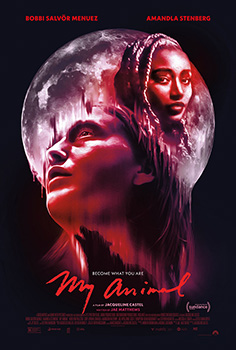 Michael Solomon, who produced My Animal, which premiered at the Sundance festival and screened at the Fantasia International Film Festival, shot the genre-breaking werewolf movie in Timmins Ontario although he wanted to locate the production in Montreal.
Michael Solomon, who produced My Animal, which premiered at the Sundance festival and screened at the Fantasia International Film Festival, shot the genre-breaking werewolf movie in Timmins Ontario although he wanted to locate the production in Montreal.
“I would say the biggest reason we moved the movie to Ontario was the tax credits, and it kills me,” Soloman told Brendan Kelly. “I’m setting up another movie now and I want to make it in Montreal even though it’s going to cost me. At the end of the day, I want to be close to my family.”
Meanwhile, Johanne Larue of SODEC told Kelly the English-speaking producers often make “films that have no connection to the life of anglos in Quebec.” Of course, many shows involve service production for US companies after tax credits. But they do employ plenty of Quebec crews and contribute to their livelihoods.
Hopefully, the best of 2023 is a sign of more good things to come in the Quebec film industry.
![]() Maurie Alioff is a film journalist, critic, screenwriter and media columnist. He has written for radio and television and taught screenwriting at Montreal’s Vanier College. A former editor for Cinema Canada and Take One, as well as other magazines, he is affiliated with the Quebec media industry publication, CTVM.Info. His articles have appeared in various publications, including Canadian Cinematographer, POV Magazine, and The New York Times. He is the Québec Correspondent for northernstars.ca.
Maurie Alioff is a film journalist, critic, screenwriter and media columnist. He has written for radio and television and taught screenwriting at Montreal’s Vanier College. A former editor for Cinema Canada and Take One, as well as other magazines, he is affiliated with the Quebec media industry publication, CTVM.Info. His articles have appeared in various publications, including Canadian Cinematographer, POV Magazine, and The New York Times. He is the Québec Correspondent for northernstars.ca.


